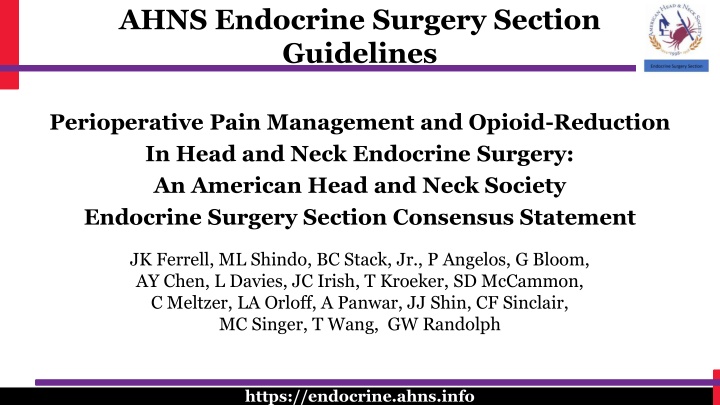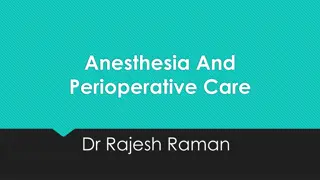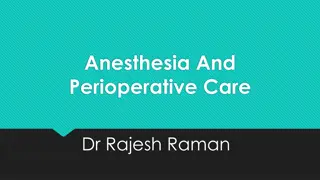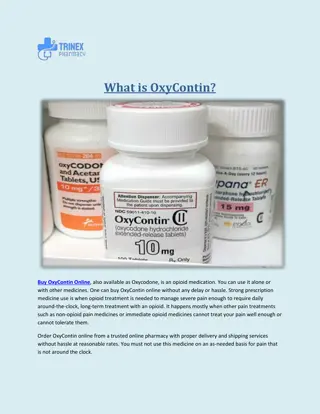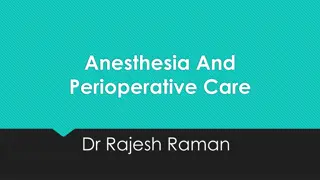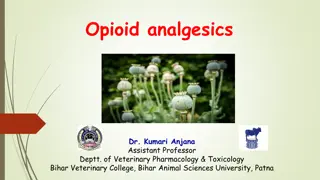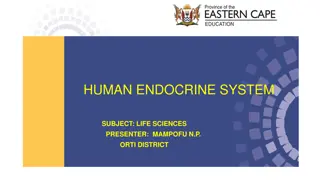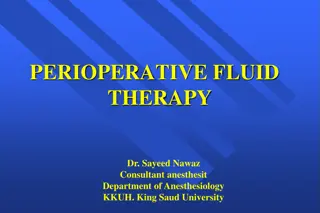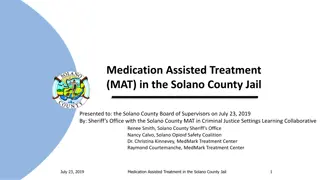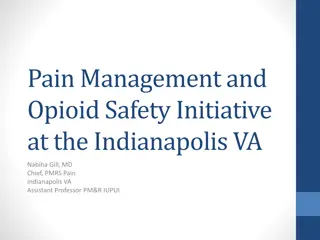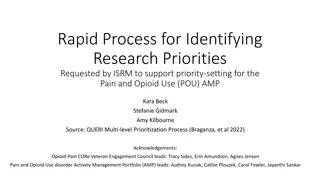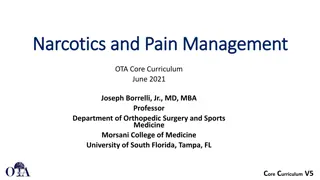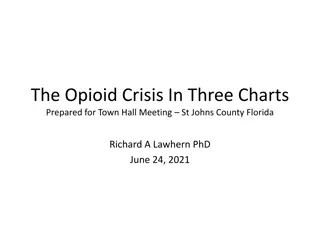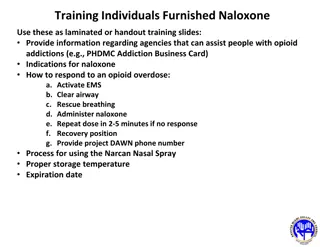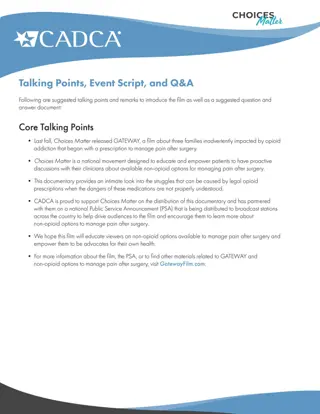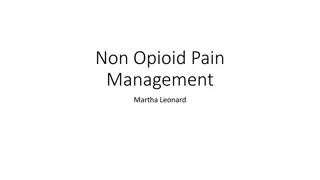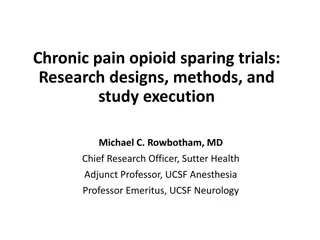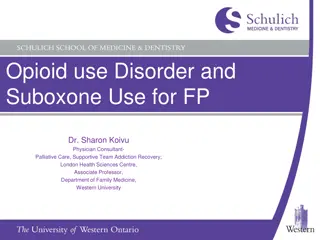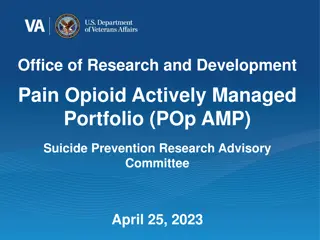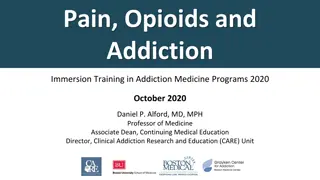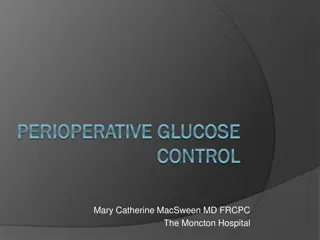AHNS Endocrine Surgery Section Guidelines: Perioperative Pain Management and Opioid Reduction
The American Head and Neck Society Endocrine Surgery Section provides consensus statements on perioperative pain management and opioid reduction in head and neck endocrine surgery. Addressing the opioid addiction crisis, the expert panel offers guidelines on pain management strategies, opioid prescribing, chronic pain, risk assessment, and patient counseling. By evaluating current literature, the panel aims to enhance practices in perioperative pain management for these procedures.
Download Presentation

Please find below an Image/Link to download the presentation.
The content on the website is provided AS IS for your information and personal use only. It may not be sold, licensed, or shared on other websites without obtaining consent from the author.If you encounter any issues during the download, it is possible that the publisher has removed the file from their server.
You are allowed to download the files provided on this website for personal or commercial use, subject to the condition that they are used lawfully. All files are the property of their respective owners.
The content on the website is provided AS IS for your information and personal use only. It may not be sold, licensed, or shared on other websites without obtaining consent from the author.
E N D
Presentation Transcript
AHNS Endocrine Surgery Section Guidelines Perioperative Pain Management and Opioid-Reduction In Head and Neck Endocrine Surgery: An American Head and Neck Society Endocrine Surgery Section Consensus Statement JK Ferrell, ML Shindo, BC Stack, Jr., P Angelos, G Bloom, AY Chen, L Davies, JC Irish, T Kroeker, SD McCammon, C Meltzer, LA Orloff, A Panwar, JJ Shin, CF Sinclair, MC Singer, T Wang, GW Randolph https://endocrine.ahns.info
AHNS Endocrine Surgery Section - https://endocrine.ahns.info
Background Opioid addiction continues to be a public health crisis Between 1999 and 2018, nearly 450,000 people died as a result of opioid misuse Crisis is multifactorial however overprescribing of opioids is a major contributing factor Secondary addiction can occur after short duration of use such as after outpatient surgery Despite growing literature, evidence-based guidelines to assist surgeons with proper outpatient opioid prescribing or alternative pain management approaches are lacking AHNS Endocrine Surgery Section - https://endocrine.ahns.info
Purpose AHNS Endocrine Section convened an expert panel to critically evaluate current literature and provide better consensus on best practices for perioperative pain management for head and neck endocrine procedures AHNS Endocrine Surgery Section - https://endocrine.ahns.info
Methods Expert panel: 18 panelists including members of the AHNS, 1 member of ThyCa, and MPH/evidence-based medicine experts Extensive review of relevant literature published between Jan 2000- April 2020 Consensus statements developed on literature review and best available evidence Modified Delphi method used to determine level of consensus for each statement AHNS Endocrine Surgery Section - https://endocrine.ahns.info
Focus of Consensus Statements Perioperative multimodality pain management strategies Postoperative opioid prescribing Pain management in patients with chronic pain Preoperative pain risk assessment and patient counseling Supportive pain management programs and technology AHNS Endocrine Surgery Section - https://endocrine.ahns.info
Results of Modified Delphi Finalized survey distributed to expert panel included 13 total statements Consensus was demonstrated for 12 statements Only statement 1c did not reach full consensus AHNS Endocrine Surgery Section - https://endocrine.ahns.info
Multimodal Perioperative Pain Management Statement 1a: Multimodality, non-opioid medication regimens can be used successfully as first-line pain management in head and neck endocrine surgery (consensus) Employing synergistic combinations of non-opioid meds (acetaminophen, NSAIDs, gabapentin) Statement 1b: Preoperative non-opioid pain medications can mitigate postoperative pain and reduce patients' overall opioid requirements (consensus) AHNS Endocrine Surgery Section - https://endocrine.ahns.info
Multimodal Perioperative Pain Management Statement 1c: In addition to proper surgical technique, intraoperative strategies including selective use of regional anesthesia and non-opioid general anesthetic agents may be beneficial in reducing the need for postoperative opioids after thyroid and parathyroid surgery (non- consensus) 3 members of panel not in agreement citing lack of strong evidence on cost versus benefit of regional cervical nerve block AHNS Endocrine Surgery Section - https://endocrine.ahns.info
Multimodal Perioperative Pain Management Statement 1d: Non-opioid medications and adjunctive strategies can effectively manage pain after head and neck endocrine procedures and reduce postoperative opioid requirements (consensus) AHNS Endocrine Surgery Section - https://endocrine.ahns.info
Postoperative Prescribing of Opioids Statement 2a: Head and neck endocrine surgeons should utilize opioid medications judiciously and only if first line non-opioid medications are insufficient or medically contraindicated If needed, <75 MME* provides adequate pain control in most opioid-na ve patients Significant proportion of patients may be managed with even less or no opioids Statement 2b: Non-opioid medications and adjunctive strategies can effectively manage pain after head and neck endocrine procedures and reduce postoperative opioid requirements *MME- morphine milligram equivalents; 75 MME = 10 tabs of oxycodone 5mg or 15 tabs of hydrocodone 5mg AHNS Endocrine Surgery Section - https://endocrine.ahns.info
Postoperative Prescribing of Opioids Statement 2c: Establishing perioperative processes that address patients' pain management enhances and supports efforts to reduce postoperative opioid prescribing Statement 2d: Evidence-based institutional process initiatives and protocols support surgeons in evaluating and improving their perioperative pain management practices AHNS Endocrine Surgery Section - https://endocrine.ahns.info
Chronic Pain and Postoperative Pain Management Statement 3: Successful postoperative pain management in patients with underlying chronic pain conditions may be enhanced through collaboration with pain medicine specialists and the judicious use of opioid medications after thyroid and parathyroid surgery (consensus) For many patients with chronic pain conditions, maintaining their baseline regimen will be sufficient If major adjustments are needed, surgeons should consult with hospital pain service and/or patients pain management provider AHNS Endocrine Surgery Section - https://endocrine.ahns.info
Preoperative Pain Assessment and Patient Education Statement 4a: Surgeons should proactively assess for patient specific factors and underlying conditions which could impact pain experiences and portend higher pain management requirements (consensus) Ex: Age < 45yrs, prior opioid use, history of alcohol abuse, medications (anxiolytics, SSRIs, ACE inhibitors) Statement 4b: Preoperative education that clearly defines pain expectations and the benefits of multimodality pain management reinforces efforts to curtail postoperative opioid prescribing (consensus) AHNS Endocrine Surgery Section - https://endocrine.ahns.info
Preoperative Pain Assessment and Patient Education Statement 4c: Surgeon performed pain management education should be strongly encouraged and, whenever possible, integrated into the preoperative workflow (consensus) AHNS Endocrine Surgery Section - https://endocrine.ahns.info
Supportive Pain Management Programs and Technology Statement 5: When available, participation in statewide prescription drug monitoring programs may curtail excessive or unnecessary prescribing of postoperative opioids (consensus) States are increasing use and enforcement of prescription drug monitoring programs (PDMPs) Evidence on the efficacy of PDMPs is mixed but studies have suggested less community diversion and lower mortality rates Additional technologies such as EMR add-ons and electronic patient pain assessments are becoming more available AHNS Endocrine Surgery Section - https://endocrine.ahns.info
Summary and Conclusions Successful, comprehensive perioperative pain management spans the continuum of the operative encounter Surgeons should proactively assess for patient-specific pain risk factors and counsel on perioperative pain management expectations Multimodality pain control is foundational to reducing unnecessary use of opioid medications postoperatively Surgeons capitalize on continuing educational opportunities and emerging technologies to improve pain management outcomes Further studies and evidence-based guidelines for perioperative pain management are clearly warranted AHNS Endocrine Surgery Section - https://endocrine.ahns.info
AHNS Endocrine Surgery Section Guidelines Perioperative Pain Management and Opioid-Reduction In Head and Neck Endocrine Surgery: An American Head and Neck Society Endocrine Surgery Section Consensus Statement JK Ferrell, ML Shindo, BC Stack, Jr., P Angelos, G Bloom, AY Chen, L Davies, JC Irish, T Kroeker, SD McCammon, C Meltzer, LA Orloff, A Panwar, JJ Shin, CF Sinclair, MC Singer, T Yang, GW Randolph https://endocrine.ahns.info
